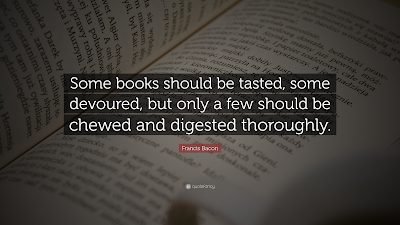Of Studies - Francis Bacon
Francis Bacon is considered as 'the father of English essays'. He was born in Yorkshire, London on January 22, 1561. He died on April 9, 16 26 London.
Bacon's essays give guidance on what to read and how to read.
He has written on several topics-religion, wisdom work, connection with people and many more. It seems he guides us on almost all the different parts of life.
Thus the reader finds better ways of living and understanding their lives. His style had brevity, vividness and terseness. He calls his essays, 'detached meditation'
Bacon uses the aphoristic style. This enables the readers to interpret and give the meaning of his statement.
In his present clay, 'On Studies, he tells us that specific fields of study shape the mind in specific ways.
The essayist says that the real object of Studies is to develop our knowledge. The effect of studies on our mind is to banish our errors and mistakes. Studies make our mind cultivated. Our mind is a mixture of abilities and disabilities. These are: e mutually incompatible.
Bacon tells us the benefits of Reading. Reading enhances that reader's intellect. He also tells us the right method of reading. The essayist focuses on studying to increase our ability to succeed in life.
The essayist says that the real object of studies is to develop our self-knowledge.
Racon starts his essay, OnStudies' saying that
Studies serve for a delight
Studies serve for ornament
Studies serve for ability.
The essayists say that when we read for delight, it is for privateness & retirement.
when we read for ornament, it is for discourse.
When we head for ability, it is for the judgment and disposition of business.
Expert men execute and judge of particulars. Bacan says the general counsels, the plots and the marshaling of affairs come best from those who are learned.
Bacon goes on to say that to spend too much time in Studies is sloth Then to be too much in ornament is affectation.
But when the judgment is made by rules, then this is the humor of scholars. These scholars are perfected by experience.
The essayists compare natural abilities to natural plants. Plants need pruning, and so does the ability need pruning by experience.
The studies give directions.
Bacon says
crafty men contemn Studies
Cimplemen admire them
wise men use them.
wise men trash not their own use. Their wisdom is won by observation. The essayists say's, " Read not to contradict & confute", Reading must not lead to believing and Taking things for granted. It is also not for talks and discourse.
Reading is to weigh and consider. Then the essayists says about the different types of books:-
He says some books are to be tasted;
some to be swallowed
and some few to be chewed and digested.
Bacon further explains that -
Some books are to be read in parts
Some to be read but not curiously and
And some should be read wholly. This should be read with diligence and attention.
The essayist goes on to lay out that -
Some books may be read by the deputy ( )
and extracts of them by others (just like your passport books). Such reading of books would not be suitable and suggested"
Bacon says, "Distilled books are like distilled water!
The further says that "Reading maketh a man, Conference a ready man; and writing. an exact man."
So says Bacon that if a man writes little, he needs to have a great memory, if he confers a little, he needs to have a present wit; if he reads little", Bacon says in a contemptuous way that "he is cunning". ''They seem to know that he does not."
The essayists now talks about the different streams. that "History makes a man wise; poets witty; a Mathematics Subtle; Natural Philosophy deep; moral glave, logic and rhetoric able to contend.
"Abesent Studia in moves" —This is a Latin line that means 'Studies influence'. Thus we see there is no obstacle, no stord, no impediment in the wit that cannot be wrought by studies.
As diseases of the body can be lessened by appropriate exercises, so it can be improved by proper Studios.
Bacon refers to different exercises he says - Bowling. is good for the stove and reins (kidney); Shooting for the lungs and breast; gentle walking for the stomach, Riding for the head and there are many more examples.
The essayists say, that-
if a man's wit be wandering let him Study mathematics;
if his wit is not apt to distinguish or find differences let him study the schoolmen.
Bacon says, "school men are coming Sectors". Cymini Sectors are those who are given to excessive subtleties in discussions and disputations. It is a Latin word meaning hair-splitter.
Further Bacon says that if you cannot prove & illustrate, let him study law.
Thus Bacon winds up his essay by saying - so every defect of the mind have a special receipt."







0 Comments